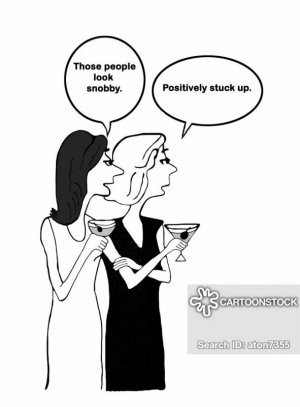grahamg
Old codger
- Location
- South of Manchester, UK
Quote
.........there is, (Dworkin writes), a trade-off between treating people equally and treating them “as equals.”
The complexities of egalitarianism are especially frustrating because inequalities are so easy to grasp. C.E.O.s, on average, make almost three hundred times what their employees make; billionaire donors shape our politics; automation favors owners over workers; urban economies grow while rural areas stagnate; the best health care goes to the richest. Across the political spectrum, we grieve the loss of what Alexis de Tocqueville called the “general equality of conditions,” which, with the grievous exception of slavery, once shaped American society. It’s not just about money. Tocqueville, writing in 1835, noted that our “ordinary practices of life” were egalitarian, too: we behaved as if there weren’t many differences among us. Today, there are “premiere” lines for popcorn at the movies and five tiers of Uber; we still struggle to address obvious inequalities of all kinds based on race, gender, sexual orientation, and other aspects of identity. Inequality is everywhere, and unignorable. We’ve diagnosed the disease. Why can’t we agree on a cure?
In January of 2015, Jeremy Waldron, a political philosopher at New York University’s School of Law, delivered a series of lectures at the University of Edinburgh on the fundamental nature of human equality. He began by provoking his audience. “Look around you,” he said, “and look at the differences between you.” The crowd included the old and the young, men and women, the beautiful and the ugly, the rich and the poor, the healthy and the infirm, the high-status and the low. In theory, Waldron said, the audience could contain “soldiers as well as civilians, fugitives and convicts as well as law-abiding citizens, homeless people as well as property owners”—even “bankrupts, infants, lunatics,” all with different legal rights.
In a book based on those lectures, “One Another’s Equals: The Basis of Human Equality,” Waldron points out that people are also marked by differences of skill, experience, creativity, and virtue. Given such consequential differences, he asks, in what sense are people “equal”? Waldron believes in our fundamental equality; as a philosopher, however, he wants to know why he believes in it.
According to the Declaration of Independence, it is “self-evident” that all men are created equal. But, from a certain perspective, it’s our inequality that’s self-evident.
Break
In Waldron’s view, (though), it’s not a binary choice; it’s possible to see people as equal and unequal simultaneously. A society can sort its members into various categories—lawful and criminal, brilliant and not—while also allowing some principle of basic equality to circumscribe its judgments and, in some contexts, override them. Egalitarians like Dworkin and Waldron call this principle “deep equality.” It’s because of deep equality that even those people who acquire additional, justified worth through their actions—heroes, senators, pop stars—can still be considered fundamentally no better than anyone else. By the same token, Waldron says, deep equality insures that even the most heinous murderer can be seen as a member of the human race, “with all the worth and status that this implies.”
https://www.newyorker.com/magazine/2020/01/13/the-equality-conundrum
.........there is, (Dworkin writes), a trade-off between treating people equally and treating them “as equals.”
The complexities of egalitarianism are especially frustrating because inequalities are so easy to grasp. C.E.O.s, on average, make almost three hundred times what their employees make; billionaire donors shape our politics; automation favors owners over workers; urban economies grow while rural areas stagnate; the best health care goes to the richest. Across the political spectrum, we grieve the loss of what Alexis de Tocqueville called the “general equality of conditions,” which, with the grievous exception of slavery, once shaped American society. It’s not just about money. Tocqueville, writing in 1835, noted that our “ordinary practices of life” were egalitarian, too: we behaved as if there weren’t many differences among us. Today, there are “premiere” lines for popcorn at the movies and five tiers of Uber; we still struggle to address obvious inequalities of all kinds based on race, gender, sexual orientation, and other aspects of identity. Inequality is everywhere, and unignorable. We’ve diagnosed the disease. Why can’t we agree on a cure?
In January of 2015, Jeremy Waldron, a political philosopher at New York University’s School of Law, delivered a series of lectures at the University of Edinburgh on the fundamental nature of human equality. He began by provoking his audience. “Look around you,” he said, “and look at the differences between you.” The crowd included the old and the young, men and women, the beautiful and the ugly, the rich and the poor, the healthy and the infirm, the high-status and the low. In theory, Waldron said, the audience could contain “soldiers as well as civilians, fugitives and convicts as well as law-abiding citizens, homeless people as well as property owners”—even “bankrupts, infants, lunatics,” all with different legal rights.
In a book based on those lectures, “One Another’s Equals: The Basis of Human Equality,” Waldron points out that people are also marked by differences of skill, experience, creativity, and virtue. Given such consequential differences, he asks, in what sense are people “equal”? Waldron believes in our fundamental equality; as a philosopher, however, he wants to know why he believes in it.
According to the Declaration of Independence, it is “self-evident” that all men are created equal. But, from a certain perspective, it’s our inequality that’s self-evident.
Break
In Waldron’s view, (though), it’s not a binary choice; it’s possible to see people as equal and unequal simultaneously. A society can sort its members into various categories—lawful and criminal, brilliant and not—while also allowing some principle of basic equality to circumscribe its judgments and, in some contexts, override them. Egalitarians like Dworkin and Waldron call this principle “deep equality.” It’s because of deep equality that even those people who acquire additional, justified worth through their actions—heroes, senators, pop stars—can still be considered fundamentally no better than anyone else. By the same token, Waldron says, deep equality insures that even the most heinous murderer can be seen as a member of the human race, “with all the worth and status that this implies.”
https://www.newyorker.com/magazine/2020/01/13/the-equality-conundrum



